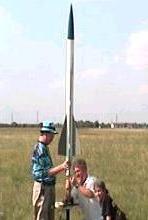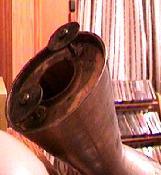| Manufacturer: | Rocketman Enterprises  |

(Contributed - by Brian Wheeler)
 Brief:
Brief:
Single stage high power rocket kit, parachute recovery, spun aluminum nozzle.
Construction:
Kit contains, one PML phenolic main body tube, one 21" payload section,
three fiberglass fins, three plywood centering rings, one strap, a plastic nose
cone, a 38mm motor tube, a motor retention system, and a Rocketman R7
parachute.
Great illustrated instructions, very easy to construct. Even though it was easy, it was still fun. Fin alignment was great, except for a little bit of sanding had to be done to get them to fit in right. The strap holding the rocket together is glued onto the side of the motor mount tube and through the top centering ring. We used a Dremel tool for the fin sanding, which must be done with a mask.
 The aluminum nozzle fits onto the back of the airframe with a coupler. It
took us half an hour to get the nozzle all the way to the tube due to more than
a very tight fit. The motor mount goes through the nozzle with one rear
centering ring at the end of the nozzle. Here, there is also a motor retention
system.
The aluminum nozzle fits onto the back of the airframe with a coupler. It
took us half an hour to get the nozzle all the way to the tube due to more than
a very tight fit. The motor mount goes through the nozzle with one rear
centering ring at the end of the nozzle. Here, there is also a motor retention
system.
Finishing:
There were decals included, but we did not use them. This was my Dad's rocket,
so he painted it like his company with a small logo on the side. The rocket
looks very cool with the aluminum nozzle at the end, and is a replica of the
last rocket in the movie October Sky.
Construction Rating: 4 out of 5
Flight:
There are no recommended motors but Ky said it could hold up to just about any
38mm motor that would fit into it. We put in 2 lbs of nose weight for the
larger I motors. This was my dad's level one rocket, so he flew it on an I284
first. The parachute didn't come out, and the rocket landed about 2 feet away
from a small private airplane in the adjoining field from our site, it then
bounced about 4 feet into the air.
The damage was minor (amazing, it had free fallen from 2000 feet), and we repaired it and then he tried again, this time on an I435-10.
Once again the boost was quick and perfect, and once again the chute didn't come out, but this time the damage was a fair amount worse. That night he fiber-glassed the damaged sections (top part of main body tube and one fin) and then I found the problem. There was no note in the instructions to put in a shock chord, but to just use the strap that came with the kit. This was our problem. The strap wasn't long enough to pull out the parachute, so when the rocket broke apart, the chute would stay inside. The next morning it flew on another I435-10, with a borrowed Kevlar® shock chord for a perfect boost, great timing on the parachute, and level 1 certification. Finally!
The kit did NOT come with a shock-chord, was not intended to come with a shock-chord, nor was one ever mentioned in the instructions. I called up Ky and he said if the delay was right it would work, but for this to be true, the strap would need to be longer. I called him after the launches and he was very cooperative and agreed that it should have a shock-chord.
Recovery:
Once you put in the shock chord, it works great. The recovery speed is perfect,
and it doesn't drift too far.
Flight Rating: 2 out of 5
Summary:
The rocket was great, and unfortunately we truly found that the kit is
extremely strong with two easily repairable damages from two 2000 foot
free-falls. Just be sure to use some shock chord or I promise you the parachute
will not deploy.
Overall Rating: 3 out of 5
 |
 |
Flights
 |
 |
 |
 |
D.R. (August 1, 2000)